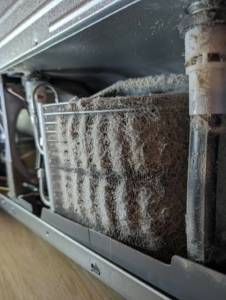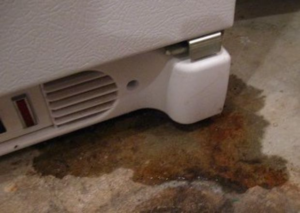
Refrigerator Repair
The Ultimate Guide to Refrigerator Repair: Tips and Common Fixes

Your refrigerator is one of the most essential appliances in your home. It keeps your food fresh, your drinks cold, and your groceries organized. When it breaks down, it can be a major inconvenience. Fortunately, refrigerator repair doesn’t always mean expensive replacements or professional service. Many common issues can be resolved with a bit of knowledge and effort. In this guide, we’ll explore common refrigerator problems, their causes, and practical repair tips to help you restore your appliance quickly and effectively.
Common Refrigerator Repair Issues and How to Fix Them
1. Refrigerator Not Cooling
If your refrigerator isn’t keeping your food cold, it’s time to investigate.
Causes:
Dirty condenser coils
Malfunctioning evaporator fan motor
Faulty thermostat
Blocked vents
Solution:
Clean the condenser coils: Dust and debris can accumulate on the coils, reducing efficiency. Use a coil brush or vacuum to clean them.
Check the evaporator fan motor: Listen for unusual noises. If the fan isn’t working, it may need replacement.
Inspect the thermostat: Use a multimeter to test for continuity. Replace if defective.
Unblock vents: Ensure vents inside the fridge are not obstructed by food containers.

2. Freezer Ice Build-Up
Excessive frost in your freezer can reduce storage space and efficiency.
Causes:
Faulty defrost heater
Damaged door seal
Clogged defrost drain
Solution:
Defrost heater: Test the defrost heater with a multimeter. Replace it if it’s not functioning.
Door seal: Check for gaps in the seal. Replace the gasket if it’s worn or torn.
Defrost drain: Clear the drain using warm water or a pipe cleaner.

3. Refrigerator Leaking Water
Puddles around your fridge can be frustrating and indicate an issue.
Causes:
Blocked defrost drain
Cracked water line
Full or misaligned drain pan
Solution:
Defrost drain: Clear any blockages using warm water.
Water line: Inspect for cracks and replace damaged sections.
Drain pan: Empty and clean the pan, ensuring it’s properly positioned.

4. Unusual Noises
A noisy refrigerator can disrupt your home’s tranquility.
Causes:
Loose components
Malfunctioning fan motor
Compressor issues
Solution:
Tighten loose parts: Check for loose screws or panels and secure them.
Replace fan motor: If the noise is coming from the back or inside the fridge, the fan motor might need replacement.
Compressor: A faulty compressor may require professional repair or replacement.

5. Fridge Not Running at All
If your fridge isn’t running, it’s a critical issue.
Causes:
Power supply issues
Faulty start relay
Broken control board
Solution:
Check power supply: Ensure the fridge is plugged in and the outlet works. Test with another appliance.
Inspect the start relay: If you hear clicking sounds but the compressor doesn’t start, replace the start relay.
Control board: Examine for burnt components or signs of damage. Replace if necessary.

Advanced Tips for DIY Enthusiasts
If you’re comfortable with more advanced repairs, consider these tips:
Replace the door gasket: A worn-out gasket can let cool air escape. Measure the old gasket and buy a replacement. Follow manufacturer instructions for installation.
Inspect the compressor relay: The compressor relay can fail over time, preventing the compressor from starting. Use a multimeter to test for continuity and replace it if necessary.
Calibrate the temperature control: If the fridge or freezer temperatures are inconsistent, recalibrate the thermostat to ensure proper operation.
Test the defrost timer: A faulty defrost timer can prevent the fridge from cycling into defrost mode. Use a multimeter to test for continuity and replace it if needed.
Check the ice maker: If your refrigerator has an ice maker that isn’t working, inspect the water inlet valve and ensure it’s not clogged. Test the motor for functionality.
Additional Section: Signs You May Need Professional Refrigerator Repair
Sometimes, despite your best efforts, refrigerator repair requires the expertise of a professional. Recognizing when to call for help can save you time and prevent further damage to your appliance. Here are some signs that indicate it’s time to call in the pros:
1. Persistent Cooling Issues
If your refrigerator consistently fails to maintain the right temperature even after cleaning the condenser coils or checking the thermostat, it might indicate a deeper issue such as a refrigerant leak or a failing compressor. Both problems require specialized tools and skills to address safely.
2. Loud or Unusual Noises
While some noise is normal for refrigerators, excessive clunking, buzzing, or grinding sounds often point to serious mechanical issues. A malfunctioning compressor or damaged fan blades could be the cause, and replacing these parts typically requires professional knowledge.
3. Electrical Problems
If your refrigerator trips your circuit breaker, shows signs of faulty wiring, or won’t power on despite checking the outlet, it’s best to leave the repair to an experienced technician to avoid the risk of electric shock.
4. Water Leaks or Frost Build-Up That Won’t Stop
Repeated water leaks or excessive frost build-up after performing basic maintenance, such as unclogging the defrost drain, may indicate a damaged component or improper internal settings that a technician can diagnose.
5. Age of the Appliance
If your refrigerator is over ten years old and showing frequent problems, a professional can help determine whether repairs are worth the investment or if it’s time to replace the unit.
By understanding when professional refrigerator repair is necessary, you can save yourself frustration and protect your appliance from further damage. Remember, timely repairs can extend the lifespan of your refrigerator and keep it running efficiently.
Additional Common Refrigerator Features and How to Maintain Them
Water Dispensers and Filters
Refrigerators with built-in water dispensers are convenient, but they require regular maintenance to ensure clean water.
Tips:
Replace water filters every six months to avoid mineral buildup.
Flush the dispenser lines periodically to prevent clogging and bacterial growth.
Check the dispenser switch for proper functionality if the water flow slows down.
Digital Control Panels
Modern refrigerators often include digital control panels that can display error codes when problems occur.
Tips:
Refer to the owner’s manual for a list of error codes and their meanings.
Perform a soft reset by unplugging the fridge for five minutes and plugging it back in.
If the control panel remains unresponsive, it might need replacement.
Energy Efficiency Upgrades
Improving your refrigerator’s energy efficiency can save money and reduce environmental impact.
Tips:
Install a smart plug to monitor energy usage and identify inefficiencies.
Ensure the fridge is positioned away from heat sources like ovens or direct sunlight.
Regularly defrost older models to prevent frost from increasing energy consumption.
Preventive Maintenance Tips
To avoid costly repairs, regular maintenance is essential:
Clean condenser coils: Do this every 6-12 months to maintain efficiency.
Inspect door seals: Ensure they’re tight to prevent cool air leakage.
Set the right temperature: Keep the fridge at 37°F and the freezer at 0°F.
Keep it organized: Avoid overloading to ensure proper airflow.
Defrost regularly: For manual defrost models, defrost when frost exceeds ¼ inch.
Check water filters: Replace the water filter every six months to ensure clean water and ice production.
Examine wiring and connections: Periodically inspect the back of the refrigerator for loose or frayed wires.
Level your fridge: Ensure it is on a level surface to prevent doors from not sealing properly or internal components from overworking.
Clean the drip pan: Remove and clean the drip pan under the fridge every few months to prevent mold and odors.
When to Call a Professional
While many refrigerator problems can be fixed with basic tools and know-how, some issues require expert help. Call a professional if:
You’re dealing with refrigerant leaks
The compressor needs replacement
Electrical components are damaged
The refrigerator still malfunctions after trying DIY fixes
Conclusion
Refrigerator repair doesn’t have to be daunting. By understanding common issues and following these repair tips, you can save time and money while extending the life of your appliance. Regular maintenance is key to preventing problems before they occur, so don’t neglect your fridge’s upkeep.
Whether it’s a quick DIY fix or a complex issue requiring professional help, staying informed can make all the difference. Need professional help? Contact Forward Appliance Repair for reliable and affordable service. We’re here to keep your appliances running smoothly!
Refrigerator Repair FAQs
How long should my refrigerator last?
Most refrigerators last between 10 to 20 years, depending on the brand, model, and maintenance practices.
How do I know when to repair or replace my refrigerator?
If the cost of repairs exceeds half the price of a new fridge, or if the unit is over 15 years old and inefficient, replacement might be a better option.
Why is my refrigerator making a humming noise?
Humming is often caused by the compressor or the evaporator fan motor. It’s normal if the noise isn’t too loud, but excessive noise may indicate a problem.
What causes a refrigerator to stop cooling but the freezer still works?
This could be due to a blocked air vent, a faulty evaporator fan motor, or a problem with the defrost system.
Can I replace the thermostat myself?
Yes, if you’re comfortable working with appliances. Use a multimeter to confirm the thermostat is faulty, and follow manufacturer instructions for replacement.
How often should I clean the condenser coils?
Ideally, clean the coils every 6-12 months to ensure optimal efficiency and prevent overheating.
Is a leaking refrigerator dangerous?
While it’s not immediately dangerous, leaks can cause water damage to your floors and indicate underlying issues like a clogged defrost drain or a cracked water line.
